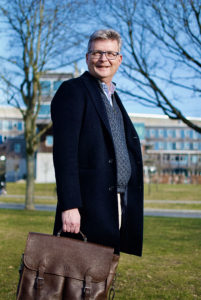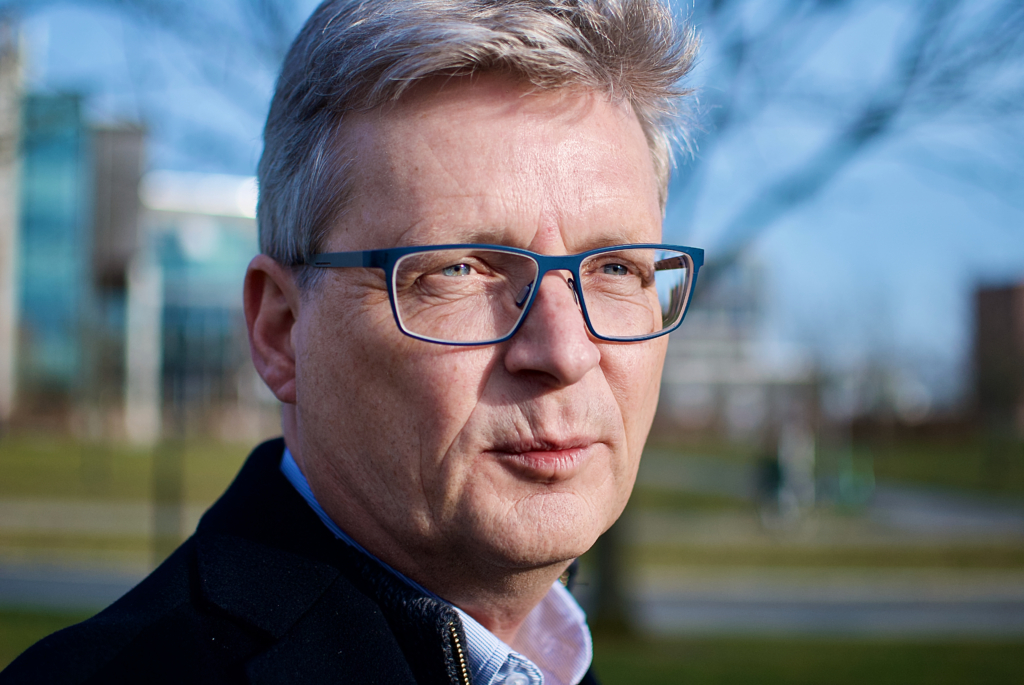Over the course of the past year, the Intergovernmental Panel on Climate Change (IPCC) published its 6th Assessment Report. Lundagård has met one of its authors, Lars J. Nilsson, for a portrait about the people behind one of the most important texts of our time.
When attending a lecture by Lars J. Nilsson, professor in environmental and energy systems studies at Lund University, barely an hour goes by without him telling a joke. His humour is best illustrated when he makes fun of himself, for example, when joking that a man like him (white and middle-aged) is “most likely a climate change denier”.
Yet, he is the opposite: Lars Nilsson is an advocate for sustainable change and an active volunteer for the Intergovernmental Panel on Climate Change (IPCC). He began as a student in Engineering Physics to then move on to the newly developed program in environmental studies in Lund. This provided Lars Nilsson with the chance to integrate his knowledge into the social and political sphere. His PhD launched not only a career as a lecturer and researcher but also a position as a contributing author of two IPCC reports.
His first contact with the IPCC was in 2007 when he was selected for the approval session of the Summary for Policymakers (SPM), the document advising policymakers to implement adequate climate policy strategies for a previous IPCC report. He was to travel to Bangkok for a conference on the report. He refers to the conference by saying, “I had never been in such a situation; it therefore took me a couple of days to understand the discussions. Yet this conference allowed me to see how big the world is, and I started to understand the political dimension of climate negotiations.”
When asked about the role of the IPCC in the climate debate, Lars Nilsson answers that “it has several roles”, for example: to help develop climate policies for many smaller countries, to model future climate scenarios and to calculate of the remaining carbon budget.

Photo: Isak Aho Nyman.
Lars Nilsson was selected as a co-author for the Special Report on Renewable Energy Sources by the IPCC. When reflecting on this report, he says, that “at the time when it developed (2009-2011), nobody was talking about a shift to 100% renewable energy, but I tried to include a sentence stating that this could be possible. Of course, this didn’t make it through the approval process.” This sentence would have hinted at the direction of restructuring the energy grid to zero emissions, which is a goal that only became seriously considered in 2015 with the Paris Agreement. Hence, Lars Nilsson’s proposal in 2009 was rejected.
In the past month, he worked to finalise the SPM of the newest IPCC report so that it could be published on April 4th. Lars Nilsson is the coordinating lead author responsible for chapter 11 “Industry” in this report, which focuses on the mitigation of climate change.
While providing the scientific basis for climate negotiations, Lars Nilsson is, however, not sure how important the reports are when it comes to climate mitigation, as “they do not lead to emission reduction directly. Politicians, however, will make use of the statements from the SPM to support their arguments and interests.”
In 2014 the last climate report, IPCC AR5, was released and Lars Nilsson expresses that in comparison to the findings back then that, “we see clearly now that the system in its totality needs to work differently.” In his opinion, the Paris Agreement of 2015 marked a mind-shift from emission reduction to zero or even negative emissions. With proof that climate initiatives will not hamper economic development, the “detachment of the issue from the state by shifting it to non-state, regional, urban, and cooperative initiatives”, are further positive developments, according to Lars Nilsson.
Looking into the transformation of the industry, which Lars Nilsson never gets tired of talking about, as it is his expertise, raises many issues, as “the question here will be whether industries should move to locations with a high amount of renewable energy or whether industries should work on storing energy so that we can then transport it.” Yet he also notes that “there are many innovative ideas, contributing to the development.”
Going further into the question of how to achieve transformative change on all levels, the new report contains chapter 5 on “Demand, services and social aspects of mitigation”. This chapter is on sufficiency, meaning the search for the “enough”, as well as the lowering of demand for energy and goods. This means that consumption is questioned. While seeing the inclusion of this chapter as something positive, Lars Nilsson also challenges the idea, as “it is a complex topic, especially in developing countries, who need more, not less.”
As an author of the report, Lars Nilsson also had one thing he wanted to see in the new report: “For me, it was important to stress that zero means zero and that this goal also applies to industries.”
Lars Nilsson says that when he chose his major, it was a broad subject with many opportunities. Seeing what he has achieved in the past 30 years, he seems to have proven himself right. Now that the new IPCC report is released, he will stay involved in international climate politics as an advisor for the European Scientific Advisory Board on Climate Change.
After a career in climate change negotiations and being a first-row spectator of all the developments of the past years, Lars Nilsson is convinced that “the shift (in the climate crisis) will happen eventually.” He bases this on two arguments: First renewable energy production is much easier, and second, he is convinced that the industry is full of normal and smart people. “I am positive and optimistic, especially as technologies are rapidly evolving and thus renewable energies become cheaper than fossil fuels.”, he says as a final remark.








